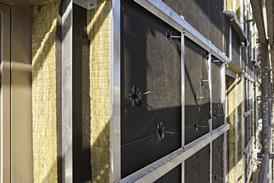Once a QS doesn’t necessarily mean always a QS. Some practitioners have moved to different areas of the building industry, while others have left construction for a wide range of career paths, ranging from company chief executive, to sport, and television.
A job for life. How outdated does that sound, now? We’re used to building up a career portfolio, looking around for a better option when we decide we need more money, a bigger challenge or simply a change.
It’s not only jobs we change more frequently but also career direction, says the Graduate Recruitment Bureau. And let’s face it, once you’re in the construction industry it offers an array of options, from structural engineering to carpentry. Almost all require numeracy and project management skills, so it’s not difficult to switch from QSing or project management to other careers within the sector. Here we talk to four people to find out how they branched out from QSing, how they enjoy their new job... and what they miss about their first jobs.
Stuart Black, chief executive Mears Group
Why did you initially choose quantity surveying as a career?
I did quite a bit of research into the courses available at college, but also had a good friend whose brother was a QS and I found out quite a bit about it from him. He enjoyed it and it seemed like an interesting career, so I thought I’d give it a go. While at college, I read an article about Bucknall Austin in Building and decided I wanted to work for them because they weren’t at all stuffy, like a lot of the industry seemed to be.
What made you change direction?
I did pure QSing for about five years at Bucknall Austin. It was a progressive organisation, branching out into all sorts of different things, which gave me an opportunity to try other areas without changing company. I did some project management, some facilities management and business development in the construction and support services sectors. About 12 months ago I was at Mouchel Parkman and was approached by Mears about this job. I was enjoying my job, but the opportunity to be chief executive of a plc was a terrific one and I moved last November.
Was it difficult to make the change?
No, I think you just take your core skills and apply them in different contexts, really. Much of my early work was in the private sector, then at Mouchel Parkman, it was with central and local government so the move to social housing has been very interesting – it’s very different to the rest of mainstream construction activity.
What does your current job involve?
My role is, on behalf of the board, to lead the organisation to the next stage of its growth. It’s a great time to enter the business. It’s done very well over the last five years, growing at 40% per year and we’re now at a stage where we want to take it to the next level, so it’s a very interesting time to come into the organisation. I probably spend around a quarter to a third of my time with shareholders and financial institutions doing investor relations, another quarter with clients and the rest on general management activities.
Do you use any quantity surveying skills?
Yes, a lot of the core skills – commercial management, negotiation and analytical skills are all still very relevant to what I do.
What do you enjoy most about your job?
It’s still all very new. I only joined the organisation six months ago as chief operating officer and was appointed chief exec two weeks ago. It’s terrific to be leading the business at this stage of its cycle, when everything’s very positive. Also, because it’s a new sector for me, I’m learning from a really good group of people, so that’s terrific. So in terms of a development experience, it’s great as well.
What has been the high point of your career so far?
I would have to say it’s this role. It had been my ambition to be chief executive of a publicly quoted company for some time.
Do you miss anything about quantity surveying?
I guess I miss the cut and thrust of dealing with property developers from my early career. That was really exciting.
The Mears Group provides facilities and support services to a range of public and private sector clients, specialising in the local authority and social housing sectors.
Mike Stewart, operations manager, Eve Group
Why did you initially choose quantity surveying as a career?
When I completed my OND in Building Construction, I realised I enjoyed setting budgets and working to them. I enjoy negotiating and the cut and thrust of making deals, so to professionalise on that was an interesting option.
What made you change direction?
I miss dealing with the whole project, from its inception through to running the contract.
Mike Stewart, Eve Group
After working as a QS for 24 years, I was given the opportunity to move into the operational side of the business rather than looking after the commercial aspect. At that point in time, I was looking for something a little bit different, so it seemed a good opportunity and it offered a much better salary, which was important at that time.
Was it difficult to make the change?
No, I didn’t even have to move offices! The only difficulty was getting rid of the old badge. Two years after I changed jobs, people were still coming to me with commercial issues. I had to put barriers up in the end, because you can only properly concentrate on one thing.
What does your current job involve?
I get involved in managing other people to design, construct and hand over mobile telecom sites which involves marketing, looking for new leads and tendering for work, as well as overseeing the contracts.
And what do you least enjoy about your job?
I guess it’s dealing with people issues. People tend to have expectations and sometimes it’s difficult to meet them, whether they’re a client or a member of staff. Contracts are a very fixed thing, if you stick to it you can’t go wrong, but people are a different matter altogether!
What has been the high point of your career so far?
I would say that was being the senior surveyor on the Sheffield Super Tram project. It was a big project, worth £240m. From a technological point of view, it was an interesting project. There was some cutting edge technology that was difficult to get hold of at first, but it makes life interesting.
Do you miss anything about quantity surveying?
I would like to move back into it, so yes! I miss dealing with the whole project, from its inception through to running the contract and getting involved with lots of different professions. The time I’ve spent as an operations manager has been interesting, but I miss getting involved with clients directly.
Eve Group is a contractor specialising in the telecommunications, broadcast and power transmission markets. Mike Stewart is operations manager for the Telecoms division.
Edward Sims, self-employed green oak carpenter
Why did you initially choose quantity surveying as a career?
The attraction was being aware of the costs and implications of contractual issues and it was a route into project management, which was a longer-term goal. I also have a degree in mechanical and electrical engineering, so I’m an M&E QS.
What made you change direction?
I was made redundant and didn’t want to go back to QSing straight away. It gave my wife and I the opportunity to fulfil a dream by buying a derelict barn that was up for sale and building ourselves a home in the country.
Eighteen months later, I’m still working on it but it’s a lot further on now! I’m originally a carpenter by trade and when I took the barn on, I wanted to bring it back to its original stature with oak trusses and so on.
Was it difficult to make the change?
Not really! I went to buy some timber from John Bruce, a chap who runs Branching Out and Craft Renaissance, a couple of excellent projects around here and he said he needed a carpenter. It was just like putting an old pair of gloves on. I settled into it and really haven’t looked back since. It was easier for me, because I’ve got a second trade skill to call upon.
What does your current job involve?
I do everything from cutting trees and converting the timber to building structures. At the moment I’m building frames for my own barn, but as well as big oak spans for private clients, I build green oak conservatories and other structures. It took a lot of research to find a way to work with green oak and glazing, but it’s been very successful.
Do you use any quantity surveying skills?
There’s too much bureaucracy in construction, and I’d like to see a lot of that streamlined.
Ashley Davies, Modus Group
I’m self employed and still involved in construction, so it’s imperative that I use those skills on occasion. There’s always that commercial element, you have to make sure you’re not making too many commercial risks and leaving yourself exposed.
What do you enjoy most about your job?
One of the most enjoyable things is a day like today when the sun was shining, I was out in the fresh air and it was absolutely fantastic. I’m always motivated to get up in the morning and go to work.
And what do you least enjoy about it?
Green oak sections are very heavy, so it can be a bit tiresome to work with it.
Do you miss anything about quantity surveying?
What I miss is the element of learning in administering contracts – almost every week you’d learn something slightly different, which you could tuck away and use again when it was necessary. It’s a massive field to work in, very diverse.
Edward works closely with Branching Out, a company near Usk, Wales that supplies hardwood from local forests.
Ashley Davies, co-director, Modus Group
Why did you initially choose quantity surveying as a career?
I wanted to work in an industry where there was a physical reward and you could see something for your labours, so it wasn’t just a paper pushing exercise.
What made you change direction?
I got more and more involved in project management, and could see an opportunity for a business concentrating on the turnkey interiors market. I had a friend who was thinking of changing direction too and one evening, in his kitchen, the concept for Modus was born. I wanted to try my hand at running my own business – it was an empowerment thing, but also the chance to try and make money for yourself comes into it.
Was it difficult to make the change?
Yes, we literally started from scratch. We set out a strategy and went out to try and convince people we were the right company to work with. We managed to convince a couple of people, had a couple of lucky breaks and it grew from word of mouth and referral, so we thought we must be doing something right.
What does your current job involve?
I’m joint MD, so my job encompasses PR and marketing, a lot of presenting and pitching to customers, account management and overseeing standards and quality on the delivery of projects.
What do you enjoy most about your job?
The variety and the freedom it gives you to determine the way you want to work and how you want to work. Growing anything is quite pleasurable, whether it’s your own career or a business.
And what do you least enjoy about it?
There’s too much bureaucracy in construction, and I’d like to see a lot of that streamlined, so we’re all a bit more efficient.
Do you miss anything about quantity surveying?
Well, I do quite a bit anyway – we’re looking at figures, contracts and value engineering a lot, so by default we’re involved in it on a daily basis. I don’t have to do the number crunching myself, but it was a good basis for what we wanted to do. Carrying over those skills into a more construction-based career and those skills has helped me no doubt.
The Modus Group is a fit-out contractor. Turnover this year will be £45m and it employs around 100 people.
Look what they’re doing now
Here are some QSs who moved a little further away from the construction Industry.
Phil Burrows
After training as a junior QS, Phil was signed up by Manchester City and marked George Best in his first game. He’s now returned to the profession.
Kevin McCabe
Originally trained as a QS, Kevin McCabe has gone on to make quite an impact on the property sector and in football. He runs developers Teesland and Scarborough and last month announced he planned to take listed housebuilder Fairbriar, where he is chairman, private. McCabe is also chairman of Sheffield United football club.
Jimeoin
An Irish stand-up comedian who had his own TV show in Ireland and has written and starred in films such as The Craic and The Extra. Yes, that’s his real name, apparently.
Phil Redmond
A highly regarded media figure who was awarded a CBE for his work, which includes creating the likes of Grange Hill, Brookside and Hollyoaks. He runs a company called Mersey TV.
Source
QS News





















No comments yet